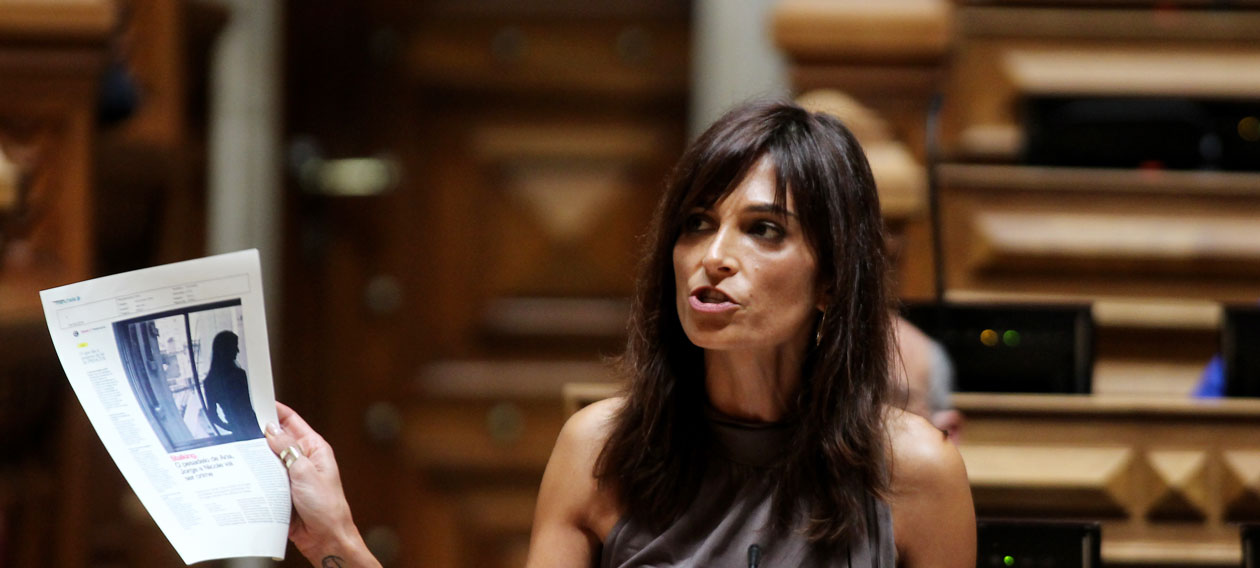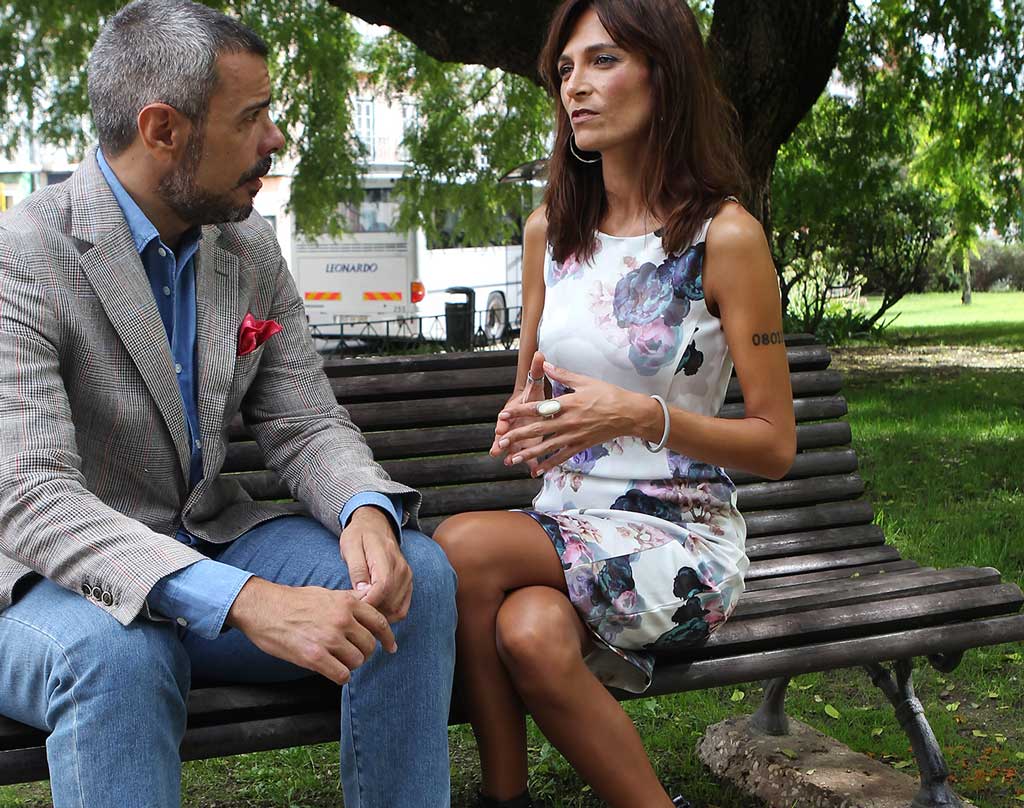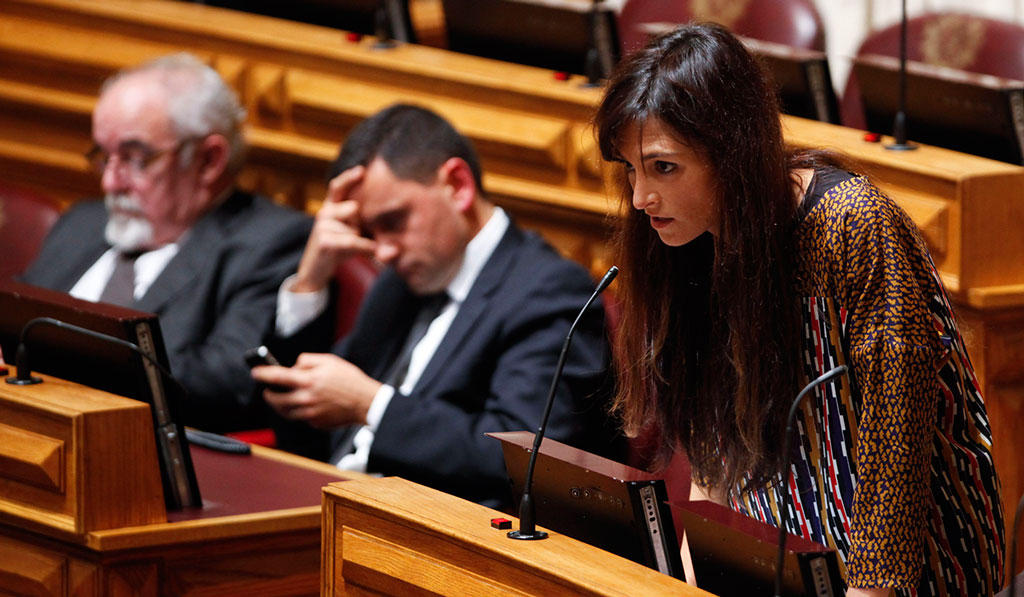
Harmony Of The Opposites. A ‘Compostella’ Pilgrimage
December 5, 2014
The Divine Comedy – (Around the world)
December 5, 2014Isabel Moreira has become one of the leading light in Portuguese politics but Dantemag finds out if the drastic changes austerity measures have imposed on so many Europeans mean the country’s constitutions can no longer deal with the upheavals of modern society?
by Mario Moniz Barreto
Constitutions, the cornerstone of any state claiming to live by the Rule of Law, are a hot topic in Portugal and elsewhere where deep austerity programmes have been launched. This means that the Constitutional Court has been placed at the centre of many politicised arguments on whether legislation passed by a parliament where the Government parties are in majority and signed by the President, even if reluctantly, does indeed comply with the country’s 1975 Constitution.
STICKING UP FOR THE SYSTEM: ISABEL MOREIRA
Who better to debate this with than one of the country’s most notorious constitutionalists? Isabel Mayer Moreira, a Socialist Party MP, and fundamental rights activist extraordinaire rants against what she calls “stupid austerity” imposed by what she deems to be a contradictory neo liberals who want to reduce state services and puritanically regulate personal freedoms.
The 38 year old Isabel, daughter of an illustrious former conservative politician and academic in International Relations, first grabbed the limelight during two of the most hard-fought debates the country has had in the last decades, one the decriminalisation of abortion, the other the granting to “same sexers” (as Gore Vidal put it) the same rights as straights enjoyed in marriage – or at least most of them. In both debates she won..
During these debates the very elegant Isabel – I know she will never forgive me for saying so – spoke fearlessly and with an assertiveness that crushed all her opponents: from the conservative catholic, to the supposedly moderate university lecturer. It is therefore no surprise that she has gone on to distinguish herself in parliament as a committed advocate for the constitution even, as she is quick to remind me, at some cost to her political career.
We meet late afternoon in a balmy and still sunny Lisbon in the public gardens surrounding the Parliament building.
I start by asking Isabel if she believes that we still have in this country a constitution as such, to which she retorts” yes, of course!”. She believes the nation’s constitution is modern, maybe one of the most modern in Europe. Isabel goes on to add that when legislation and budgets had measures judged to be unconstitutional the principles they violated had nothing to do with the constitution as such, but with basic principles such as ‘proportionality’ or ‘confidence’. Principles, Isabel stresses, are present in all constitutions of democratic states the world over and that “only a fool” would think of revising them.
Not satisfied with this first answer I go for round 2. This government has not had one single budget measure that hasn’t been referred to the Constitutional Court, as have other pieces of reform legislation. So do we indeed still live under the same constitution?
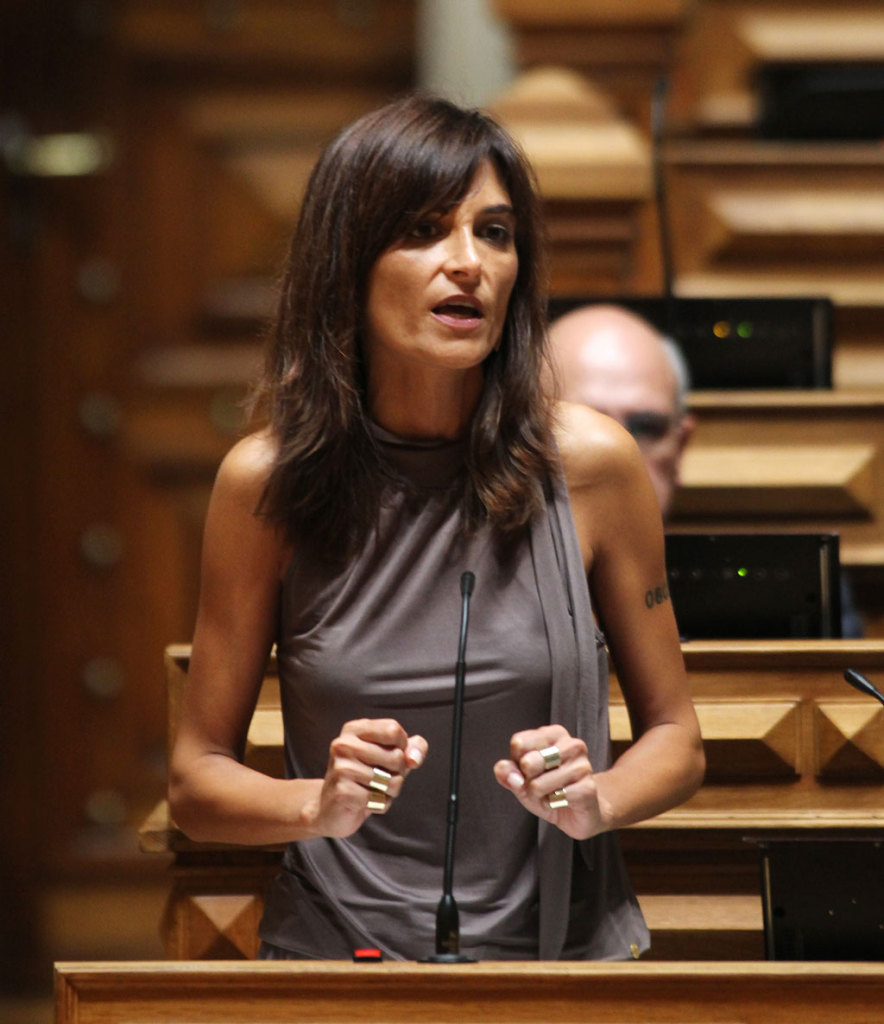
Isabel Moreira insists on a yes. Of course, it is extraordinary to see so many cases being successfully referred to the Constitutional Court. And yet the system worked. Rule of Law prevailed. Parliament and Government had to go back to the drawing board and work around those rulings to come up with other solutions.
Perhaps the most unusual aspect here in Moreira’s view is how the Constitutional Court found itself at the centre of the political stage and how, for such a long time, the head of state and others involved in the process either refused to act or respond.
She adds: ‘The Constitutional Court’s ruling may have even aided the government, by preventing greater reductions in pensioners’ and public servants’ income. This in turn boosted consumer spending and with that some growth”.
Ironically Isabel says that “the constitution hasn’t changed, it hasn’t been reviewed, the way it is interpreted hasn’t changed, the way it is checked hasn’t been modified, with so many issues declared unconstitutional. So the only thing that really needs to change is the Government, hopefully at the next elections in 2015”.
NEW RIGHTS, OLD QUESTIONS
As in most countries, so in Portugal, citizen’s rights are enshrined in the Constitution. Isabel identifies “new” as well as “old” issues with human rights that could use a face-lift. She also believes that the Constitution much like a “living thing” is adaptable to almost every context and time.
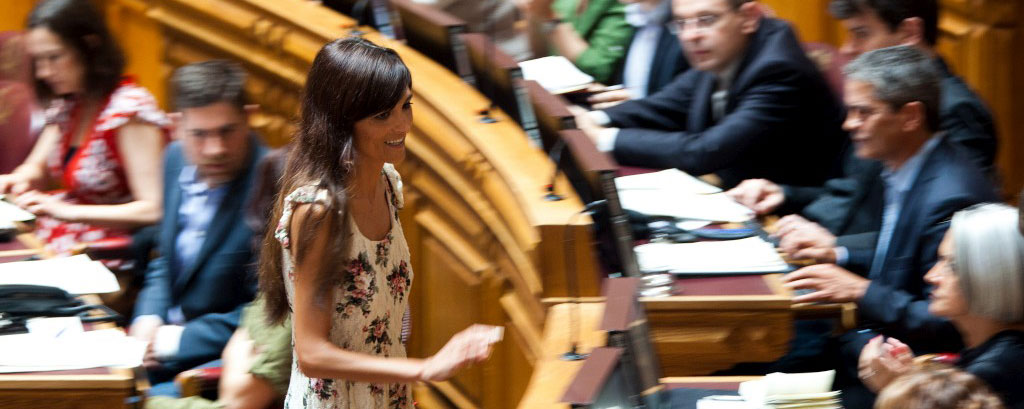
This is an area close to her heart. Isabel had tattooed on her arm the date when same-sex marriage was legalised.
But an even more urgent matter for Isabel Moreira is the European-wide new reality that will sooner or later have to be addressed constitutionally. The poverty trap into which so many young and old, graduates and the less qualified have fallen into. The jobless, but also those in work, so often in part-time jobs, who are not even entitled to the minimum wage which, in Portugal, is about 475€ a month.. A guaranteed right to life with dignity should come under the scope of what constitutions normally include as basic principles, thereby legally obliging institutions to act
This impoverishment of the middle classes, together with the even greater decline of the poorest among the poor, in so many countries where inequality is rising, as Piketty so accurately describes in his magnum opus “Capital”, is a consequence of, as Isabel puts it, “an ideological programme for public policy, inspired by flawed economists that attacks pensioners, public servants and the poorest people whose survival depended on already meagre subsidies, and, who, in Portugal, were not exempted from “savage cuts” even if they earned as little as 600€ per month!”
Once again I feel Isabel’s blood racing. She is doubly unhappy: this path is unfair as it is ineffective. She is baffled at how anyone can still be convinced that greater flexibility in firing someone and other measure that make southern Europe’s workforces one of the least regulated in the world, can lead to more prosperity. She points out that protected workforces are highly productive in places like Germany, or Denmark, or The Netherlands.
DOES THE CHECKING NEED TO BE RECHECKED?
Constitutional Courts tend to be passive in the way they go about ensuring basic principles are adhered to. Cases need to be brought before them before they can pronouce. Otherwise we would risk subverting these checks and balances by creating ‘judicial governments’.

Isabel defends the way the system is set up in Portugal. It is not so dissimilar from a lot of others around the world. The Constitutional Court has its judges appointed by several institutions based on a lot of political wrangling. She goes on to point out that, like for instance in the US, something happens the moment a judge takes office – they usually leave their former political allegiances at the door. This results in some surprising rulings, namely a Republican being more forward thinking then a Democrat.
When confronted with what US Supreme Court Justice Stevens advocates in his recent book “Six Amendments: How and Why We Should Change the Constitution”, Isabel thinks of the issues he prioritises for amendment, two would be relevant in Europe: racial gerrymandering (fiddling with electoral districts to enhance the chances of success for the political party in power) and “sovereign privilege” (by which state and state services have greater protection under the law than private companies do). Aggressive tax collection services is an area Isabel thinks state has too much power.
THE RISE OF THE EXTREMISTS
Legislative elections in Europe in the last few years have thrown up some bitter surprises: the rise of extreme right wing parties as well as that of populist political movements, from the UK, to Hungary, from the Netherlands to France, from Italy to Greece.
Can, or should, constitutions do more to stem this trend?
Not according to Isabel. She believes constitutions are already doing enough. In Portugal’s case fascist political parties are banned. In 1975 the country was emerging from a forty-eight year-long extreme right-wing regime. To this day every political group has to register with the Constitutional Court to be allowed to run in elections. There is a process of checks: from the number of supporters, to an analysis of the party’s statutes. Over the past three decades only one political party has been declared unconstitutional.
The MP would rather see us all dealing with the rise of extremist movements not by using legal means, but through politics – denouncing these organisations for what they are and mobilising voters against them. So, strip the sheep’s clothes from the likes of Marine Le Pen!

THE SECURITY ISSUE
Whistle-blowers like Assange, Manning, or Snowden have outed the incredibly intrusive workings of agencies like the NSA and the total disregard for our right to privacy. Furthermore they have also demonstrated the effectiveness of data collected in defusing security issues. Should we not therefore question if our rights have taken time out?
Isabel complains that “there is a group of politicians claiming to be liberal who know so little about what liberal thinking really means in relation to this subject. They lose sight of the distinction between positive and negative freedoms”. This refers to how far our personal freedoms can go before they start affecting third parties. She cannot accept therefore this state meddling as well as the presumption that we are all guilty of something.,as it ignores any principle of proportionality, just because it is easier and simpler to do so. On the contrary, as Isabel puts it, “the intransigent defence of rights, freedoms and our guarantees requires us to brush aside simplicity”.However she acknowledges any solution to this issue must be within an internationally agreed framework.
FROM SECURITY TO MORALS, A SHORT STEP
On this Isabel thinks there are common characteristics in “loss of freedom and in the attaining of freedom”. Both take small baby steps, which makes it harder for people to realise what is being done and then oppose it. Isabel exemplifies this ‘nanny-state’ method in what has happened to smokers, who are treated like criminals, morally weak people polluting other people’s air.. Isabel, who incidentally used to smoke nearly two packs a day and has changed to electronic cigarettes, is infuriated at the way these are also being persecuted. Why? Because health officials believe smoking, or rather, vaporising an electronic cigarette provides a bad example in public. In her words, health authorities would “rather see a smoker dead, then a vaporiser happy!”
It is as if we now all have a duty to educate each other at the cost of freedom and singularity: A minor detail, that she thinks – and, for what it is worth, I also think – is an “escalating process along a totalitarian path”. The state wants to be a “behaviour modulator”, resorting to restrictions, taxes and prohibitions, and denying a person’s right of choice.
Do we then, to use a John Rawls term, need to come up with a revised “idea of public reason”? Isabel replies with an eloquent phrase, “The state cannot defend me from myself”.
POST SCRIPT
I round off my conversation with Isabel by asking her if she feels we have either reached the end of history or we are on the verge of a series of violent explosive events? She shudders at this. She has just finished reading “The World of Yesterday”, Zweig’s memoirs and she found herself relating completely with that sad, nostalgic report of life in the last days of the Austro-Hungarian Empire and the horror that followed its demise. Isabel, while maintaining a hopeful, yet realistic attitude, fears the parallels between Vienna then and Brussels now may be all too evident. The catastrophic results of the fall of the former would also be similar if the latter, the European integration project, were to fail.
Feeling the growing lack of hope and optimism, she nevertheless believes it is her duty to carry on the struggle: against inequality and these ideologically based austerity programmes, which are eroding our freedoms.
As a community, we need to reconnect with basic ethics. We have to redress intergenerational solidarity. We need to claim back the bond between socio economic classes and declare,no, the poor are not responsible for the state they are in. We need to go back and read again what most constitutions have always proclaimed and remind politicians what has in many cases been forgotten and, in others, misrepresented.

After all what other man-made charters drafted with the distinct aim of defining how we live together in civilised society can declare with such felicity and beauty
“Life, liberty and the pursuit of happiness”
and in our specific European context “Liberté, égalité et fraternité”?



